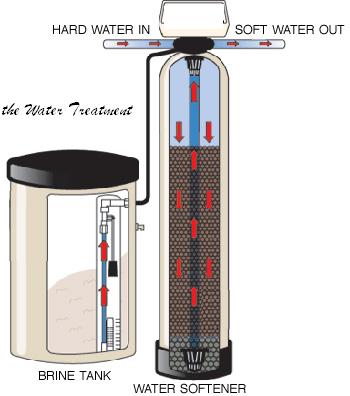

Water Softner
Softener Water Treatment
What is Hardness?
Hardness is caused by hard water containing high concentration of calcium and magnesium ions. Water is considered to be hard if it has a hardness of 100 mg/L or more as calcium carbonate. Measurements of hardness are given in terms of the calcium carbonate equivalent, which is an expression of the concentration of hardness ions in water. Hardness generally enters groundwater as the water percolates through minerals containing calcium or magnesium. The most common sources of hardness are limestone (which introduces calcium into the water) and dolomite (which introduces magnesium.) Since hardness enters water in this manner, groundwater generally has a greater hardness than surface water.
Hardness is generally caused by calcium (Ca2+) and magnesium (Mg2+) ions dissolved in water.However, hardness can be caused by several other dissolved metals as well, including strontium (Sr2+), iron (Fe2+), and manganese (Mn2+). All of the hardness-causing ions are divalent cations, meaning that they have a charge of positive two.
Types of Hardness
Hardness in water is caused by a variety of divalent cations, primarily calcium and magnesium. These cations have a tendency to combine with anions (negatively charged ions) in the water to form stable compounds known as salts. The type of anion found in these salts distinguishes between the two types of hardness – carbonate and non carbonate hardness
carbonate hardness is caused by metals combined with form of alkalinity. Alkalinity is the capacity of water to neutralize acids and is caused by compounds such as carbonate, bicarbonate, hydroxide, and sometimes silicate, and phosphate. Carbonate hardness is sometimes called temporary hardness because it can be removed by boiling water.
Non carbonate hardness forms when metals combine with sulfates and chlorides.
Non carbonate hardness cannot be broken down by boiling the water, so it is also known as permanent hardness. When measuring hardness, it is typical to consider total hardness which is the sum of all hardness compounds in water, expressed as a calcium carbonate equivalent. Total hardness includes both temporary and permanent hardness caused by calcium and magnesium compounds.
Effects of Hardness
Carbonate hardness is the most common and is responsible for the deposition of calcium carbonate scale in pipes and equipment. The equation below shows how this deposition is formed in the presence of heat:
Calcium bicarbonate ~ Calcium carbonate + Water + Carbon dioxide
Ca(HC03)2 ~ CaC03 + HP + CO2
In addition to the scale ( calcium carbonate) produced, carbon dioxide resulting from this reaction can combine with water to give carbonic acid which causes corrosion of iron or steel equipment.
Non carbonate hardness reacts with the carbonate alkalinity found in soap and detergents as in this reaction and forms soap Scum:
Calcium sulphate + Sodium carbonate = Calcium carbonate + Sodium sulfate
CaS04 + NaC03 -t CaC03 + Na2S04
Acceptable concentration of total hardness in water is 200 mg/ L.
The effects of hardness in water are:
- They react with soap to form a scum, which is unsightly,
- The reaction of hard water with soap results in excessive use of soaps and detergents.
- Hard water may also cause taste problems in drinking water and may shorten the life of fabrics washed in hard water.
- Hard water harms many industrial processes such as scales inside boilers and pipes.
So industries often require much softer water than is usually required for domestic water treatment use. Water softening is required in industrial water treatment use.
4 Responses to “Water Softner”
Leave a Reply







 LIKE TO GET UPDATES
LIKE TO GET UPDATES  TO GET EXPERT GUIDE
TO GET EXPERT GUIDE
good information
I realized hard water is how much harmful!!!
IT HAS NO PICTURES!!
This is my first visiting this blog, you have very nice blog and interest article. Thanks for share.